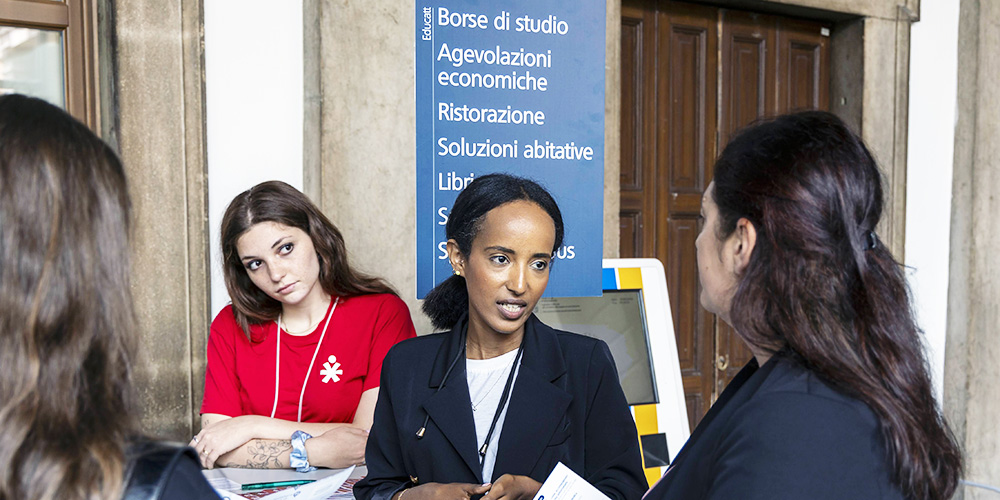 Open evening Brescia
(In)formati a Brescia: esplora il tuo futuro Postlaurea!
Partecipa ad una serata di informazione il 18 marzo! Parla con i referenti dei Master, incontra gli alumni e scopri l’offerta della Formazione executive: CattolicaPer, Servizi di Psicologia, Formazione continua e Job talk!
Open evening Brescia
(In)formati a Brescia: esplora il tuo futuro Postlaurea!
Partecipa ad una serata di informazione il 18 marzo! Parla con i referenti dei Master, incontra gli alumni e scopri l’offerta della Formazione executive: CattolicaPer, Servizi di Psicologia, Formazione continua e Job talk!
Scegli il tuo percorso
In evidenza
Eventi
192 elementi trovati
-
Orientamento lauree triennali OLTRE IL FILM: incontri tra scienza e cinema
Brescia - Dal 21 gennaio 2025 al 09 aprile 2025 -
seminario Corso di formazione per la ricerca bibliografica, banche dati, struttura tesi di laurea
Roma - Dal 07 marzo 2025 al 28 marzo 2025 -
Incontri Pomeriggi manzoniani
Milano - 12 marzo 2025 -
Convegno L'ordinamento internazionale in tensione
Milano - 12 marzo 2025 -
Stage&Placement - Facoltà di Economia Dialogando con Antonella Puzzo, partner di EY
Milano - 12 marzo 2025 -
Seminario Il gruppo del Buongiorno
Brescia - 12 marzo 2025 -
Giornata di studi Filologia e storia degli studi danteschi
Brescia - 12 marzo 2025 -
Stage & Placement The Practice of Emotional Intelligence for Personal Development
Piacenza - 12 marzo 2025 -
Stage & Placement The Practice of Emotional Intelligence for Personal Development
Piacenza - 12 marzo 2025 -
Stage & Placement CV LAB | Imposta il format più adeguato al tuo contesto professionale
Piacenza - 12 marzo 2025 -
Workshop interdisciplinare Signore degli eserciti
Milano - 12 marzo 2025 -
Presentazione Generare speranza in un mondo frammentato
Milano - 12 marzo 2025 -
Ciclo di Seminari Raccontare l’economia
Milano - 12 marzo 2025 -
Ciclo di seminari Le imprese italiane e le politiche per l’innovazione e la ricerca: il punto di vista della consulenza
Cremona - 12 marzo 2025 -
Lezione aperta Fenomenologia e metafisica
Milano - 12 marzo 2025 -
Seminario La scheda unica annuale del corso di studio
Milano - 12 marzo 2025 -
Workshop EU payment system: tra Digital Euro, MiCAR e FIDA
Milano - 12 marzo 2025 -
Convegno Diritto, filosofia e altri saperi. Relazione: cognizione e affezione
Milano - 12 marzo 2025 -
Seminario Innovation & digital transformation nell’healthcare. Prospettive ed esperienze d’impresa. Seconda edizione 2025
Roma - 12 marzo 2025 -
Covegno La Speranza nella Cura: un percorso di Fede, Scienza e Umanità
Roma - Dal 12 marzo 2025 al 13 marzo 2025 -
Ciclo di Lezioni Il patrimonio culturale e la sua valorizzazione
Milano - 13 marzo 2025 -
Conferenza Ars Docendi
Milano - 13 marzo 2025 -
Il Pianoforte in Ateneo Il Pianoforte in Ateneo
Milano - 13 marzo 2025 -
Lezione aperta Sviluppo turistico e pianificazione del territorio
Brescia - 13 marzo 2025 -
Dies Academicus Dies Academicus 2024-2025
Piacenza - 13 marzo 2025 -
presentazione volume Elementi di arbitrato commerciale internazionale
Milano - 13 marzo 2025 -
Lezione aperta Paura, desiderio, speranza
Milano - Brescia - 13 marzo 2025 -
STAGE&PLACEMENT Cv Point – Gi Group
Milano - 13 marzo 2025 -
Lezione aperta Le parabole tra Vangelo e tradizione rabbinica
Milano - 13 marzo 2025 -
Lezione aperta Non esistono ragazzi cattivi
Milano - 13 marzo 2025 -
Lezione aperta La valutazione nella cooperazione internazionale allo sviluppo
Milano - 13 marzo 2025 -
Lezione aperta La situazione della Palestina nel prisma degli organi internazionali di giustizia
Milano - 13 marzo 2025 -
Lezione aperta Orizzontalità del diritto
Milano - 13 marzo 2025 -
Seminario Il modello Unesco
Milano - 13 marzo 2025 -
Seminar The future of communication
Milano - 13 marzo 2025 -
Seminario internazionale L'immagine dell'arabo nella cultura occidentale vs l’immagine dell’occidente nella cultura araba
Milano - 14 marzo 2025 -
Lezione aperta “Quinquagenarium, qui proprie poenitentium est, juxta jubilaeum” (Hier. Ep. 121 ad Algasiam): Girolamo e la cristianizzazione del Giubileo
Brescia - 14 marzo 2025 -
Series of lectures International arbitration through the eyes of practitioners
Milan - 14 March 2025 -
Lezione aperta Il potere governativo tra norma e prassi
Brescia - 14 marzo 2025 -
Lezione aperta Paura, desiderio, speranza
Milano - Brescia - 14 marzo 2025 -
Ciclo di Seminari La Chiesa “esperta in umanità”
Milano - 14 marzo 2025 -
Ciclo di seminari Le politiche della Regione Lombardia al servizio della competitività e della sostenibilità
Cremona - 14 marzo 2025 -
Incontro Vedere l'infinito
Milano - 14 marzo 2025 -
Seminario Exploring new technologies (chat gpt) for foreign languages, linguistics and literature
Milano - 14 marzo 2025 -
Convegno Alberto Manzi. Conoscere un maestro per crescere
Milano - 14 marzo 2025 -
Workshop Artificial Intelligence, Machine Learning e pratica attuariale
Milano - 14 marzo 2025 -
Ciclo di lezioni Linguistica storica e filologia (4^ edizione)
Milano - 17 marzo 2025 -
Series of lectures International arbitration through the eyes of practitioners
Milan - 17 March 2025 -
Webinar Giurisprudenza e Linguaggi dei media: modalità di ammissione e indicazioni tecniche
Milano - 17 marzo 2025 -
Lezione aperta Gli studi e l’interesse per la storia romana e greca in Giappone in epoca tardo edo e meiji (1800-1912)
Milano - 17 marzo 2025 -
Presentazione volume Cos’è (e non è) l’UE: il punto di vista del diritto amministrativo europeo
Milano - 17 marzo 2025 -
Presentazione volume La trappola dei conflitti intrattabili
Milano - 17 marzo 2025 -
Stage&Placement - Facoltà di Scienze linguistiche e letterature straniere L’entreprise en évolution
Brescia - 17 marzo 2025 -
Lezione aperta Italo Svevo, lo scrittore degli ossimori
Milano - 18 marzo 2025 -
Ciclo di incontri Natura e sostenibilità: verità e miti tra illusioni e speranze
Cremona - 18 marzo 2025 -
Lezione aperta Il management del volontariato attraverso l’accompagnamento: riflessioni e modelli dalla ricerca internazionale
Brescia - 18 marzo 2025 -
Seminario Il “De Magno Schismate” di Antonio Baldana
Milano - 18 marzo 2025 -
Seminario Alleanze e potere marittimo: il ruolo dell'Italia
Milano - 18 marzo 2025 -
Seminario Oltre l’informazione. Popotus, risorsa educativa per la scuola
Brescia - 19 marzo 2025 -
Ciclo di Seminari Raccontare l’economia
Milano - 19 marzo 2025 -
Stage&Placement Career Hub - Dai un boost alla tua carriera!
Milano - 19 marzo 2025 -
Orientamento Incontro di preparazione al TIEC: Test di Ingresso a Economia in Cattolica
Online, su Webex - 19 marzo 2025 -
Presentazione volume Accabò
Brescia - 20 marzo 2025 -
Ciclo di Seminari La Traduzione Letteraria
Milano - 20 marzo 2025 -
Conferenza “Science and Religion Studies”: riflessioni su un settore disciplinare
Brescia - 20 marzo 2025 -
Seminario Scrivere la memoria triennale e la tesi di laurea magistrale
Brescia - 21 marzo 2025 -
Conferenza Per una cultura della legalità
Brescia - 21 marzo 2025 -
Convegno Il tedesco, perché SÌ!
Brescia - 21 marzo 2025 -
Seminario internazionale Conoscenza profetica e libertà umana tra medioevo e rinascimento
Milano - 24 marzo 2025 -
Ciclo di lezioni Linguistica storica e filologia (4^ edizione)
Milano - 24 marzo 2025 -
Series of lectures International arbitration through the eyes of practitioners
Milan - 24 March 2025 -
Stage & Placement Gestire la sostenibilità: l’approccio di RAJA Italia
Piacenza - 24 marzo 2025 -
Lezione aperta L’invenzione di Shanghai
Brescia - 24 marzo 2025 -
Stage & Placement Il ciclo incassi-pagamenti e la dinamica finanziaria riflessa nell'informativa di bilancio
Piacenza - 24 marzo 2025 -
Recruiting Day Recruiting Week
Milano - Dal 24 marzo 2025 al 28 marzo 2025 -
Seminario Pensare la politica
Milano - 25 marzo 2025 -
Ciclo di Seminari Climate change, diritti umani, sostenibilità ed esg
Milano - 25 marzo 2025 -
Ciclo di incontri Quando il dramma umano canta. La speranza sulle ali della musica
Cremona - 25 marzo 2025 -
Convegno D’annunzio: una didattica da rifondare
Brescia - 25 marzo 2025 -
Workshop interdisciplinare Signore degli eserciti
Milano - 25 marzo 2025 -
Ciclo di Seminari La Chiesa “esperta in umanità”
Milano - 25 marzo 2025 -
Ciclo di incontri Il diritto internazionale privato nell’esperienza del giurista pratico
Milano - 25 marzo 2025 -
Ciclo di Seminari Costruire cittadinanze culturali. Territori montani ri_generati
Piacenza - 26 marzo 2025 -
Stage & Placement How to boost your communication efficacy
Piacenza - 26 marzo 2025 -
Stage & Placement Formulare e implementare la strategia: il caso Gruppo Zonin1821
Piacenza - 26 marzo 2025 -
Stage & Placement IL COLLOQUIO DI GRUPPO ricreato attraverso la metodologia dell’ASSESSMENT CENTER. Case study con focus su analisi e risoluzione di una situazione lavorativa.
Piacenza - 26 marzo 2025 -
STAGE&PLACEMENT LinkedIn Game & Lab
Milano - 26 marzo 2025 -
Ciclo di Seminari Raccontare l’economia
Milano - 26 marzo 2025 -
Stage & Placement Training Public Speaking Skills for personal and academic success
Piacenza - 27 marzo 2025 -
Stage & Placement CONSULENZA STRATEGICA COMMERCIALE
Piacenza - 27 marzo 2025 -
Ciclo di Lezioni Il patrimonio culturale e la sua valorizzazione
Milano - 28 marzo 2025 -
Incontro Niccolò Tartaglia: un matematico bresciano nell’Italia del Cinquecento
Brescia - 28 marzo 2025 -
Seminario 13° Tesi day
Brescia - 28 marzo 2025 -
Open Day Open Day Unicatt
Brescia, Cremona, Milano, Piacenza - Dal 28 marzo 2025 al 12 aprile 2025 -
Ciclo di Seminari La Chiesa “esperta in umanità”
Milano - 28 marzo 2025 -
Lezione aperta Le chiavi del cielo e quelle della terra. Il giubileo di Bonifacio VIII (1300)
Brescia - 31 marzo 2025 -
Evento Mettiti nei miei panni
Cremona - 01 aprile 2025 -
Lezione aperta Freud aveva davvero ragione?
Brescia - 01 aprile 2025 -
Ciclo di lezioni I Giubilei nella storia
Milano - 01 aprile 2025 -
Inaugurazione della mostra Apocalisse: la speranza corre oltre il velo
Cremona - 01 aprile 2025 -
Stage & Placement INTERVIEW LAB | Prepare yourself by following the main guidelines and simulate an individual interview with the recruiter
Piacenza - 01 aprile 2025 -
Lezione aperta Pensare stanca. Passato, presente e futuro dell’intellettuale
Milano - 01 aprile 2025 -
Seminario Ai margini dell’Ecumene
Brescia - 02 aprile 2025 -
Conferenza Il problema di Plateau
Brescia - Dal 02 aprile 2025 al 04 aprile 2025 -
Ciclo di Seminari Opportunità e buone pratiche per le Aree interne e montane
Piacenza - 02 aprile 2025 -
Stage & Placement CONTROLLO QUALITA’ - ASSICURAZIONE QUALITA’
Piacenza - 02 aprile 2025 -
Ciclo di Seminari Raccontare l’economia
Milano - 02 aprile 2025 -
Ciclo di seminari Innovazione Armonica: una via italiana alle grandi sfide di transizione. L’esperienza di Entopan e dell’Harmonic Innovation Ecosystem
Cremona - 02 aprile 2025 -
Ciclo di Lezioni Il patrimonio culturale e la sua valorizzazione
Milano - 03 aprile 2025 -
Conferenza Ars Docendi
Milano - 03 aprile 2025 -
Il Pianoforte in Ateneo Il Pianoforte in Ateneo
Milano - 03 aprile 2025 -
Stage & Placement How to communicate with emotional intelligence. Let’s train with the LEGO® SERIOUS PLAY® method
Piacenza - 03 aprile 2025 -
Stage & Placement Competenze, cultura aziendale e attitudini personali: il TALENT MANAGEMENT come strumento per la valorizzazione delle risorse umane
Piacenza - 03 aprile 2025 -
Lezione aperta La scrittura del tennis. Giornalismo, letteratura, editoria
Brescia - 03 aprile 2025 -
Seminar The future of communication
Milano - 03 aprile 2025 -
Lezione aperta Il cantiere delle riforme istituzionali
Milano - 04 aprile 2025 -
Ciclo di seminari a.a. 2024/2025 FORmazione MEtodologica (FORME)
Milano - 04 aprile 2025 -
Stage & Placement LINKEDiN LAB | Create and publish the perfect profile
Piacenza - 04 aprile 2025 -
Ciclo di Seminari La Chiesa “esperta in umanità”
Milano - 04 aprile 2025 -
Ciclo di incontri Il diritto internazionale privato nell’esperienza del giurista pratico
Milano - 04 aprile 2025 -
Convegno inaugurale Novità dallo scavo di San Casciano dei Bagni (SI)
Milano - 04 aprile 2025 -
Seminario La professione docente. Aver cura delle relazioni dentro e fuori la scuola
Brescia - 04 aprile 2025 -
Seminario Exploring new technologies (chat gpt) for foreign languages, linguistics and literature
Milano - 04 aprile 2025 -
Seminario Le nuove frontiere per gli sviluppi sostenibili: AI, innovazione e formazione per la tutela dell’ambiente
Brescia - 04 aprile 2025 -
Formazione continua - Lifelong Learning L’embodied cognition nella riabilitazione: dalle neuroscienze alle pratiche evidence-based
Milano - 05 aprile 2025 -
Seminario internazionale Conoscenza profetica e libertà umana tra medioevo e rinascimento
Milano - 07 aprile 2025 -
Seminario Pensare la politica
Milano - 07 aprile 2025 -
Evento Shakespeare in musica
Milano - 07 aprile 2025 -
Ciclo di Seminari Climate change, diritti umani, sostenibilità ed esg
Milano - 08 aprile 2025 -
Evento Mettiti nei miei panni
Piacenza - 08 aprile 2025 -
Ciclo di lezioni I Giubilei nella storia
Milano - 08 aprile 2025 -
Celebrazione eucaristica In preparazione alla Santa Pasqua
Cremona - 08 aprile 2025 -
Incontri Pomeriggi manzoniani
Milano - 09 aprile 2025 -
Lezione aperta 5.000 anni di pratiche giubilari: note storico-religiose
Brescia - 09 aprile 2025 -
Ciclo di Seminari Appennino Hack
Piacenza - 09 aprile 2025 -
Stage & Placement Students give a presentation in pairs or alone. Discussion and Feedback
Piacenza - 09 aprile 2025 -
Stage & Placement PERSONAL BRANDING LAB | Marketing relazionale per presentazione di sé in chiave storytelling, job application e cover letter
Piacenza - 09 aprile 2025 -
Series of lectures International arbitration through the eyes of practitioners
Milan - 10 April 2025 -
Ciclo di Seminari La Traduzione Letteraria
Milano - 10 aprile 2025 -
Laboratorio didattico Insegnare la letteratura tedesca nella scuola secondaria superiore
Milano - 10 aprile 2025 -
Seminar The future of communication
Milano - 10 aprile 2025 -
Lezione aperta Gli istituti dell’amministrazione condivisa quale strumento di politica sociale nella città
Brescia - 11 aprile 2025 -
Giornata di studi Giornata Aldo Menichetti
Milano - 11 aprile 2025 -
Ciclo di Seminari La Chiesa “esperta in umanità”
Milano - 11 aprile 2025 -
Seminario L’adozione dei libri di testo. Quali implicazioni professionali ed etiche?
Brescia - 11 aprile 2025 -
Convegno Per una storia delle scienze politiche in Italia
Milano - Dal 13 aprile 2025 al 14 aprile 2025 -
Talks La storia di Gianluca GALLI, Founder e former owner di @QUAM
Piacenza - 14 aprile 2025 -
Incontro Semi di speranza nell’avventura della scienza
Brescia - 15 aprile 2025 -
Incontro Semi di speranza nell’avventura della scienza
Brescia - 15 aprile 2025 -
Stage & Placement Training Public Speaking Skills for personal and academic success
Piacenza - 16 aprile 2025 -
Ciclo di Seminari Raccontare l’economia
Milano - 16 aprile 2025 -
Ciclo di Seminari La Chiesa “esperta in umanità”
Milano - 28 aprile 2025 -
Ciclo di lezioni I Giubilei nella storia
Milano - 29 aprile 2025 -
Workshop interdisciplinare Signore degli eserciti
Milano - 29 aprile 2025 -
Lezione aperta L’anno del Grande ritorno e del Grande perdono. Il Giubileo del 1950
Brescia - 30 aprile 2025 -
Seminario Innovation & digital transformation nell’healthcare. Prospettive ed esperienze d’impresa. Seconda edizione 2025
Roma - 30 aprile 2025 -
Ciclo di Seminari La Chiesa “esperta in umanità”
Milano - 02 maggio 2025 -
Talks La storia di Guido RAVENNA, CEO Montebello Advisory
Piacenza - 05 maggio 2025 -
Scientific Colloquium The Hope for a Nourished Planet: which agenda for Catholic Universities?
Cremona - Dal 05 maggio 2025 al 06 maggio 2025 -
Ciclo di lezioni I Giubilei nella storia
Milano - 05 maggio 2025 -
PhD Course Non linear dynamics in economics and physics
Brescia - Dal 05 maggio 2025 al 08 maggio 2025 -
Lezione aperta Anno 1300: il Giubileo di Bonifacio VIII e gli artisti
Brescia - 06 maggio 2025 -
Lezione aperta Il Giubileo del 2000
Brescia - 06 maggio 2025 -
Evento Mettiti nei miei panni
Milano - Dal 06 maggio 2025 al 07 maggio 2025 -
Ciclo di lezioni I Giubilei nella storia
Milano - 06 maggio 2025 -
Seminario Costruire la salvezza
Brescia - 07 maggio 2025 -
Workshop interdisciplinare Signore degli eserciti
Milano - 07 maggio 2025 -
Lezione aperta I rapporti pubblico-privati nel sistema di accoglienza dei migranti umanitari
Brescia - 08 maggio 2025 -
Il Pianoforte in Ateneo Il Pianoforte in Ateneo
Milano - 08 maggio 2025 -
Stage & Placement Students give a presentation in pairs or alone. Discussion and Feedback
Piacenza - 08 maggio 2025 -
Ciclo di Seminari La Traduzione Letteraria
Milano - 08 maggio 2025 -
Stage & Placement RICERCA & SVILUPPO
Piacenza - 08 maggio 2025 -
Stage & Placement THE GROUP INTERVIEW recreated through the ASSESSMENT CENTER methodology. Case study with focus on analysis and resolution of a work situation.
Piacenza - 09 maggio 2025 -
Lezione aperta Lavorare scrivendo
Milano - 09 maggio 2025 -
Lezione aperta Retorica, poetica e critica letteraria nell’Italia del Seicento
Brescia - 09 maggio 2025 -
Seminario Exploring new technologies (chat gpt) for foreign languages, linguistics and literature
Milano - 09 maggio 2025 -
Ciclo di Seminari La Chiesa “esperta in umanità”
Milano - 12 maggio 2025 -
PhD Course Statistical Methods for Physical and Biomedical Sciences
Brescia - Dal 12 maggio 2025 al 27 maggio 2025 -
Evento Mettiti nei miei panni
Brescia - 13 maggio 2025 -
Workshop interdisciplinare Signore degli eserciti
Milano - 14 maggio 2025 -
Incontro con l'autore Daniele Mencarelli
Milano - 14 maggio 2025 -
Evento Workshop Prova l'orchestra e Concerto degli studenti
Milano - 15 maggio 2025 -
Ciclo di seminari a.a. 2024/2025 FORmazione MEtodologica (FORME)
Milano - 16 maggio 2025 -
Seminario internazionale Conoscenza profetica e libertà umana tra medioevo e rinascimento
Milano - 23 maggio 2025 -
Seminario Il diritto di contare
Brescia - 04 giugno 2025 -
Il Pianoforte in Ateneo Il Pianoforte in Ateneo
Milano - 05 giugno 2025 -
Ciclo di seminari a.a. 2024/2025 FORmazione MEtodologica (FORME)
Milano - 12 giugno 2025 -
Ciclo di seminari a.a. 2024/2025 FORmazione MEtodologica (FORME)
Milano - 19 settembre 2025 -
Il Pianoforte in Ateneo Il Pianoforte in Ateneo
Milano - 25 settembre 2025 -
Ciclo di seminari a.a. 2024/2025 FORmazione MEtodologica (FORME)
Milano - 09 ottobre 2025 -
Il Pianoforte in Ateneo Il Pianoforte in Ateneo
Milano - 16 ottobre 2025 -
Il Pianoforte in Ateneo Il Pianoforte in Ateneo
Milano - 13 novembre 2025
Succede in ateneo

Lutto
Bruno Pizzul, il più bravo di tutti Dopo la scomparsa del grande telecronista, il nostro docente Giorgio Simonelli ha ritratto l’amico e il maestro con cui ha sempre condiviso la passione per il calcio Info
Brescia
Violenza sulle donne, un video del Dams per la Polizia "Oltre l’Amore" è un cortometraggio di giovani attori e registi che si chiude con il contributo musicale di Renga e Nek e sarà diffuso nelle sale cinematografiche del circuito "Il regno del cinema"
Milano
Master Msba, Graduation Day con Milena Gabanelli La nota giornalista keynote speaker dell’evento conclusivo del Master in Sustainable Business Admnistration: «La vostra determinazione e sostenibilità – ha detto agli studenti - saranno la chiave per affrontare sfide del futuro»Piacenza
Testimoni in cattedra. Gianni Franco Papa, ad di BPER Banca, dialoga con gli studenti Gianni Franco Papa, amministratore delegato di BPER, ospite in Cattolica a Piacenza per un dialogo con gli studenti di Economia e Giurisprudenza.Milano
Monica Maggioni, dalla Cattolica ai fronti di guerra La giornalista Rai, alumna dell’Ateneo, protagonista del ciclo “Raccontare la guerra” promosso da AseriMilano
L’Italia secondo Auditel In Cattolica la presentazione del volume che celebra i 40 anni della società di analisi dei dati d’ascolto tv. Ospite speciale Gerry ScottiRoma
La scomparsa di Giovanni Scambia Dopo una breve malattia, è morto al Gemelli il professore Ordinario di Ginecologia e Ostetricia della Cattolica, Direttore Scientifico dell’IRCCS Fondazione Policlinico Universitario A. Gemelli, tra i massimi specialisti mondiali in Ginecologia Oncologica
africa, inaugurazione anno accademico
Dies Academicus 2024 – 2025 a Brescia. Il discorso integrale di Firmin Edouard Matoko Firmin Edouard Matoko
africa, inaugurazione anno accademico
Inaugurazione Anno Accademico 2024/25 a Roma. La prolusione di don Dante Carraro Dante Carraro
africa, english content
Inaugurazione Anno Accademico 2024/2025. Il discorso integrale di Leymah Gbowee Leymah Gbowee
inclusione
Ma non si può più dire niente? Il linguaggio inclusivo tra resistenze e cambiamenti Claudia Manzi, Alexandra Young
letteratura, pari opportunità
Donne per la pace impegno e dialogo contro le guerre Raffaella Iafrate, Claudia Mazzucato
demografia, lavoro
Italia 2050 Che paese sarà l’Italia nel 2050? È possibile oggi capire che strada prendere per governare i cambiamenti in atto? Per governare l'incertezza del futuro bisogna evitare di semplificare problemi complessi. Dobbiamo pensare a lungo termine, considerare tutte le variabili in gioco e creare una rete globale di conoscenza. A cura di Marzio Mian e Nicola Scevola 5 episodi
inclusione
Tutti inclusi Un viaggio tra le voci dell’Università per esplorare gli effetti dell’intelligenza artificiale nella nostra vita. Perchè i robot sono già qui con noi. O forse contro di noi. Alleati dell’uomo o nemici dell’umanità? Massima espressione di intelligenza oppure d’incoscienza? 5 episodi
migranti
Sconfinati L’onda dei profughi in fuga dalla guerra in Ucraina sconvolge l’Europa e impone di aggiornare il dibattito sugli esodi e l’accoglienza, fenomeni che da decenni dividono le coscienze e la politica del Vecchio Continente. Le voci-guida sono quelle degli esperti dell'Ateneo, integrate da testimonianze nazionali e internazionali di primo piano. Una serie podcast in cinque puntate dell'Università Cattolica a cura Marzio Mian e Nicola Scevola, pubblicata su Avvenire 5 episodi
migranti, politica estera
2025, andata o ritorno Una serie di Avvenire realizzata in collaborazione con l’Università Cattolica, che trae spunto dai grandi temi emersi alla Settimana sociale dei Cattolici italiani di Trieste. Cinque puntate per cinque dimensioni chiave di un anno, il prossimo, che si preannuncia come un sottile e delicato crinale. 5 episodi
media
Io sono la radio Una serie a cura degli studenti del Master Fare Radio dell'Università Cattolica del Sacro Cuore 5 episodi
letteratura, pedagogia
Ritratti di un tempo Ci sono personaggi che segnano un’epoca. Alcuni di fama indiscussa sono diventati miti o “leggende”, altri meno noti alle grandi platee sono riconosciuti perché hanno contribuito a una scoperta scientifica, hanno vinto un Premio Nobel, o hanno avuto una vita spiritualmente esemplare, o sono diventati un’icona del loro tempo in campo letterario, artistico, musicale. Attraverso queste donne e questi uomini, prende forma di volta in volta un periodo storico, una generazione, una cultura. Affidiamo questi ritratti ai docenti dell’Università Cattolica del Sacro Cuore per ascoltare racconti, aneddoti, interpretazioni e lasciarsi trasportare da provocazioni e suggestioni. 11 episodi
sociologia
Padri e Madri della Sociologia Racconti, aneddoti e storie di chi ha formato le idee sulla società. Li raccontano in questa serie podcast le autrici e gli autori che hanno contribuito alla stesura del manuale di Sociologia generale (Vita e Pensiero, 2022) curato da Rita Bichi 7 episodi

















